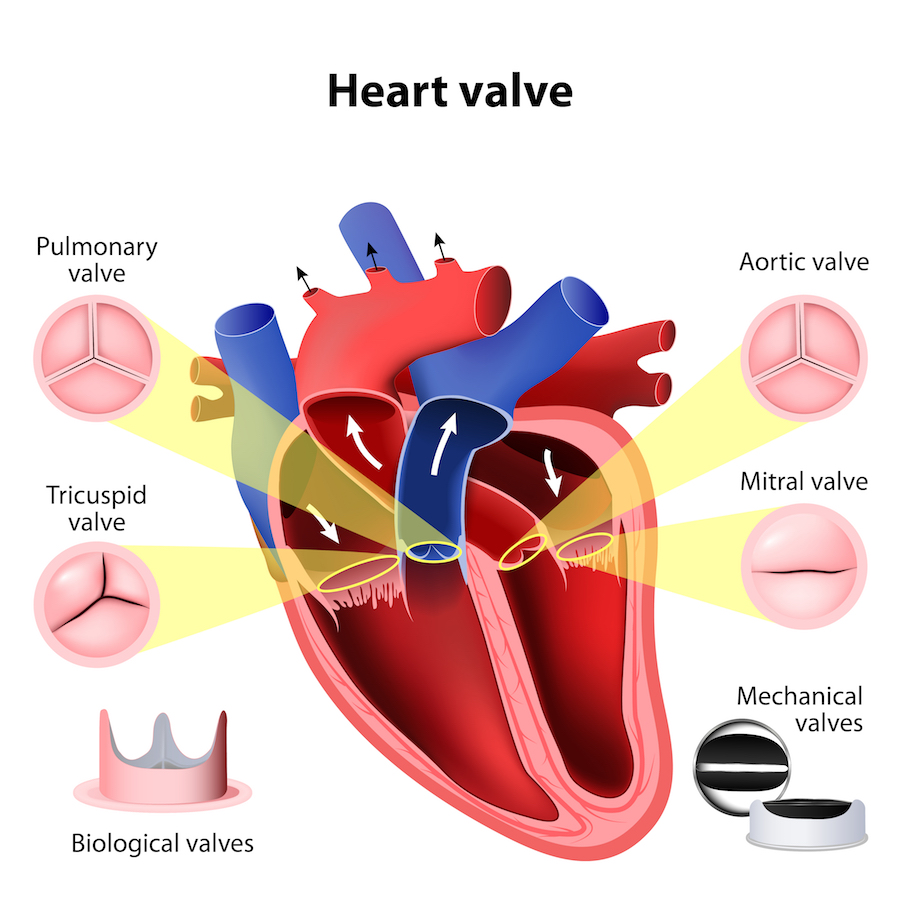Cardiac valve replacement surgery consists of replacing a non-functional heart valve with a mechanical or biological valve. It is usually the aortic valve that is affected.
Heart valves separate the different cavities of the heart to ensure proper blood flow between the different heart cavities.
These valves consist of two or three sheets called valves that open to allow blood to pass through and close to prevent it from going back.
The heart has 4 valves: aortic, mitral, pulmonary and tricuspid. The role of these valves is to pump blood from the heart and to the heart to circulate blood throughout the body. A problem with a valve can trigger the reversal of blood flow, which can cause problems such as chest pain or heart failure.
The cause of valve problems in the heart is usually congenital heart defects or heart valve diseases.
The operation is generally performed with an open heart. Surgery consists of removing the non-functional heart valve and replacing it with a new valve based on biological or mechanical tissue.
Biological heart valves are made from the tissue of a bovine animal, usually from calves or pigs. It will be installed after the defective valve has been removed. Biological heart valves can also come from donors, which is called a homograft. Biological valves last about 15 years before they need to be replaced. It is recommended from 60 to 65 years old.
Mechanical heart valves are designed to replicate the function of the human heart valve. They are made of a prosthetic material (pyrolytic carbon) and, unlike a biological heart valve, they generally do not need to be replaced.
Heart valve replacement may be recommended in patients with angina, aortic stenosis or aortic regurgitation.
Duration of hospital stay
7 to 10 days.
Convalescence period of 3 months.
Average length of stay
4 to 6 weeks.
The doctor will have to give his/her consent for the patient to go home.

Every year, nearly 11 million patients go abroad in search of medical care. At MEDICAIM, we provide our patients with access to the best hospitals and doctors around the world. Contact us to learn more about your treatment options.
Ask for your free quote abroad
Start your medical stay by requesting a quote. Our customer service department will help you find the clinic that best suits your needs and get you a quote.
The patient will have to perform a series of tests before the operation: blood tests, x-rays and physical examinations to determine if the patient's general state of health is compatible with the operation.
At least two weeks before the procedure, the patient should refrain from taking certain medications such as aspirin and stop smoking.
The patient must be fasting from midnight the day before the operation. The patient is admitted the day before or the morning of the operation.
The patient should wash with disinfectant soap before the operation.
This operation is performed under general anaesthesia, by opening the sternum (median sternotomy), and requires the installation of an extracorporeal circulation (heart-lung machine) that restores the heart, so it is called an "open heart" operation. Techniques under development allow this type of surgery to be performed through a smaller incision on the chest.
The valve used may be mechanical or biological.
The procedure can last from 3 to 6 hours.

Once the operation is completed, the patient is transferred to the intensive care unit for 24 to 48 hours stay for increased monitoring of the heart and lungs.
Then, the patient is transferred to the surgical unit for a period of 4 to 5 days.
During the 3-month recovery period, the patient remains active and can practice regular activities while limiting significant effort. Rapid mobilization and daily physical activity are encouraged.
The main side effects are weakness and energy loss after surgery, which will gradually fade with a return to regular activities. A follow-up with the surgeon is done within three months after the surgery.
Potential risks:
Infection, bleeding, kidney failure, valve failure, arrhythmia, heart attack, death.
Some complex diseases such as cancer can lead some patients to seek a second medical opinion. Almost 50% of patients using the second medical opinion have seen their treatment options evolve. Seeking a second medical opinion is perfectly legitimate when faced with a serious illness.
Click here to find out more about the second MEDICAIM medical opinion
MEDICAIM takes care of the follow-up on a case-by-case basis. www.medicaim.com
MEDICAIM is looking for the best specialists for you and we will offer you several renowned doctors.
MEDICAIM organizes your entire stay for you: post-operative nursing care, biological follow-up, therapeutic, nutritional and psychological support.
Any additional questions? Ask your MEDICAIM doctor about it: careteam@medicaim.com
Some needs and conditions are more complex than others. In case of doubt, please send us additional information to establish a customized quote.
Ask for a quoteCertains besoins et pathologies sont plus complexes que d’autres. En cas de doute, faîtes-nous parvenir des informations complémentaires pour établir un devis sur-mesure.
Demander un devisEntrust us with your medical file and it will be examined by a specialist doctor. The goal?
Allow you to evaluate all your treatment options.